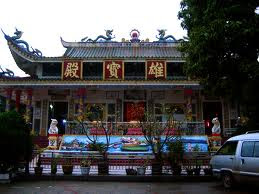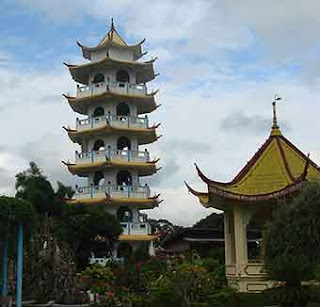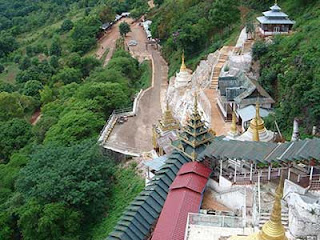Yangon,
formerly known as Rangoon, was the capital of Myanmar, is known for its
colonial architecture, which although decaying, remains an almost
unique example of a 19th-century British colonial capital. Friendly
street vendors, traditionally dressed local people, attracting old
Chevrolet buses and trishaws, all make a feel like a museum of Yangon
downtown life.
Shwedagon, the heart of Yangon, is the most profoundly honoured pagoda in the country and interesting history behind. According to the legend, the Shwedagon Pagoda was constructed during the time of the Buddha which is more than 2,500 years ago and where
the holy hair relics of the Buddha were enshrined. Towering to a height
of 326 feet (100 meters) above the city, Shwedagon Pagoda is the famous
landmark noticeable from miles around. It is one of the wonders of the
world and the most revered pagoda in Southeast Asia. Yangon
Yangon,
the capital city, is the most important gateway to Myanmar. Evergreen
and cool with lush hot trees, shady parks and idyllic lakes, Yangon has
earned the name of "The Garden City of the East". If you do not think
it, please just take a satellite view of green Yangon on internet using a
tool like Google Earth. In adding to those nature's presents, Yangon is
home to polished pagodas and, churches and monument of British colonial
era.

Bago
Situated
80 km north east of Yangon, Bago makes a perfect day trip or can also
be an element of 2 days trip to Kyaikhtiyo Golden Rock Pagoda or even a
longer tour including Mawlamyine Moulemein). It is home to a big
reclining Buddha image and the golden Shwemawdaw Pagoda, a notable
landmark in Bago. There is a noted monastery where an end is made to
take photos of Buddhist monk’s position in queue in the late morning for
their last meal of the day.

Golden Rock
The
rather rigorous trip to this unique pilgrimage site is always satisfied
with a fabulous sight of a huge rock weighing 600 tons, insecurely
balanced at the edge of a crag of Paung Laung Mountain Chain, around 200
km Southeast of Yangon. On top of the boulder is a delicate pagoda,
enshrined with a single strand of hair relic of Buddha, which is said to
be the prime force maintains the balance of this huge boulder.

Mawlamyine
Mawlamyine
is also recognized as Moulemein, a name given by the British colonial
settlers. Visitors to Mawlamyine are simply charmed at the scenic beauty
and its temperate climate. The impression of post-colonial decay is
still palpable here as this town was an administration hub of British
Raj in the early 19th Century. It’s also a good-looking and tropical
town with a ride of stupa-capped hills on one side and the sea on the
others.

Bagan
The
town of Bagan (formerly spelled as "Pagan"), central Myanmar (Burma),
located on the left bank of the Irrawaddy River and approximately 90
miles (145 km) southwest of Mandalay. The site of an old capital city of
Myanmar, Pagan is a pilgrimage centre and contains very old Buddhist
shrines that have been restored and repaint and are in current use.
Ruins of other shrine and pagodas cover a wide area. The most attractive
of the temples are Ananda Temple, Dhammayangyi Temple, Shwezigon
Pagoda, and Thatbyinnyu Temple.

Mount Popa
A
side trip from Bagan set in the middle of lovely hill and forest
landscape, Mt. Popa is a steep-sided volcanic peak devoted to the famous
"Nat" spirits of Myanmar. A shrine to these fear and appreciated
conventional character lies at the foot of "Taungkalat", a volcanic
plug. The nearby and the Mount Popa itself are enclosed with leafy and
lush forest which is in abundance filled with various species of flora
and fauna. It can be called an oasis in the central dry zone of Myanmar.

Mandalay
It
is second largest city and the last Royal Capital of Myanmar. Many
historical buildings and attractive sights, temples and pagodas, with
excursions to close by attractions avail. This is also a center for silk
and cotton weaving. The Mandalay hill, the Maha Muni Buddha Image is
the ideal images of Buddhism. Mandalay houses at smallest amount a third
of the nation's 150,000 monks and nuns. Mandalay is surrounded by its
ancient neighboring cities as Mingun, Sagaing, Innwa (Ava), and
Amarapura.

Pyin Oo Lwin (Maymyo)
A
cool hill station, over 1,000 meters above sea level, found during
colonial times and a valuable side trip from Mandalay. Here company can
enjoy beautiful scenery, a cool climate and nostalgic atmosphere of
former days in its old buildings and botanical gardens (now known as
Kandawgyi National Park, home to varied species of birds, insects,
orchids and trees. The sightseer will find the markets in Pyin Oo Lwin
very inviting. In the surrounding, there are many water falls among
which Pwe Kauk and Anisakan falls are well known.

Inle Lake
A
completely special dimension to the Myanmar travel experience. Here the
stress is on lovely lake scenery, hazy distant mountains and
interesting local society. The vast lake, natural and clean, is studded
with floating islands and is renowned for its scenic beauty, unique
leg-rowers and colorful local markets. This vast picturesque lake, 900
metres above sea-level, is one of the main tourist attractions in
Myanmar. The lakeshore and lake islands bear 17 villages on stilts,
mostly occupied by the Intha people.

Kalaw
Kalaw
stand high on the western edge of the Shan Plateau. It is 70 km west of
Taungyi, about middle along the Thazi-Taungyi road. This was a popular
hill station in the British days and it is still a nonviolent and quiet
place. At an altitude of 1320 m it is also pleasantly cool and a good
place for hiking amid gnarled pines, bamboo groves and rugged mountain
scenery. A former colonial British hill station, this small-town offers
cool temperatures (Kalaw sits at 1,300 meters elevation) and plenty of
trekking opportunities.

Pindaya
Pindaya
is a small quiet town balanced on the bank of the placid Botaloke Lake.
Pindaya cave is a huge cave where thousands of Buddha images of teak
wood, marble, alabaster, brick, cement and lacquer in various size and
shape are enshrined since the 11th century. Huge monastery compounds
with numerous pagodas and temples in different stages of dilapidation
are much respected by such ethnic groups as the Shan, Danu and Paoh
living in the environs of Pindaya.

Kyaing Tong (Keng Tong)
Kyaing
Tong is known for its scenic beauty and many colorful ethnic tribes.
located in the eastern Shan State and 452 km from Taunggyi and 176km
from Tachileik. Places of interest around Kyaingtong are, the Spa, Naung
Tong Lake, Sunn Taung Monastery, Central market and Traditional Lacquer
ware works and weaving factory.There are many villages of various
ethnic tribes resided around Kyaing Tong.

No comments:
Post a Comment